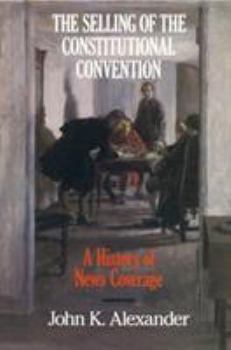The Selling of the Constitutional Convention: A History of News Coverage
Select Format
Select Condition 
Book Overview
This book is a fascinating analysis of news management in the 1780s that sheds new light on the role of the press in early America.
Format:Hardcover
Language:English
ISBN:094561215X
ISBN13:9780945612155
Release Date:December 1990
Publisher:Globe Pequot Publishing Group Inc/Bloomsbury
Length:240 Pages
Weight:1.25 lbs.
Dimensions:0.8" x 6.0" x 9.0"
Customer Reviews
1 rating
Provocative, tendentious, and very suggestive.
Published by Thriftbooks.com User , 18 years ago
The first order of business is to note that the reviewer below either is talking about another book or has some sort of personal animus against Professor Alexander. Slavery is mentioned a total of fours times in this book. Once is in reference to a mistaken idea about what the Constitution would propose for the institution of slavery, once in regards to the many American sailors held in slavery by Algerine pirates and twice in regards to an abstract concept of political slavery that the country would fall into if it wasn't careful. So the reviewer below is either mistaken or treading toward libel. Whatever. The second point is to note that my five star rating was given in part to balance out the one star below. Four stars would be about right. Alexander's thesis is that vast majority of the newspapers throughout America came out not only in favor of the proposed Constitution after it was published but acted as "propaganda instruments" to prepare the public to accept the document during the whole of the Convention itself (p.3 of Alexander). He quotes letters from three publishers, David Humphreys, John Babcock and Thomas Claxton as showing that all three of them saw themselves as "political partisans who had championed the convention"(p.4). And therein lies my problem with Alexander's book. These few quotes are the only ones Alexander offers that directly support his thesis. The rest of his arguments are based on a combination of a statistical argument and what I call, "the argument from wishful evidence". The statistical argument is quiet well done and very suggestive. John Kaminski (one of the main editors of The Documentary History of the Ratification of the Constitution) gave Alexander access to the newspaper archives of the DHRC. Alexander read all issues of all newpapers (right around 90) that have survived that were published during the Convention. So much for being poorly researched! Any article that got reprinted more then ten time he decided was a "popular" reprinting. (His reason for this number is given on p. 229- the most popular reprinting achieved 46 appearances. Anything that achieved about 25% of that Alexander thus deemed popular). He then set about to examine the patterns of reprinting. The newspapers at the time freely exchanged copies with each other. The editors felt free to reprint, often without much attribution, articles or essays that had appeared in other newspapers. Sometimes they would even edit or add text into the copied material. Alexander determined that the coverage during the Convention was very much in favor of whatever the Convention would come up with and that the reprint patterns were even more so. Anything that was critical of the effort to amend the Articles of Confederation and of any of the members of the Convention rarely was reprinted even if it contained information that should have been considered newsworthy. There were only two or three newspapers that attempted anything like even-handed coverage [A





